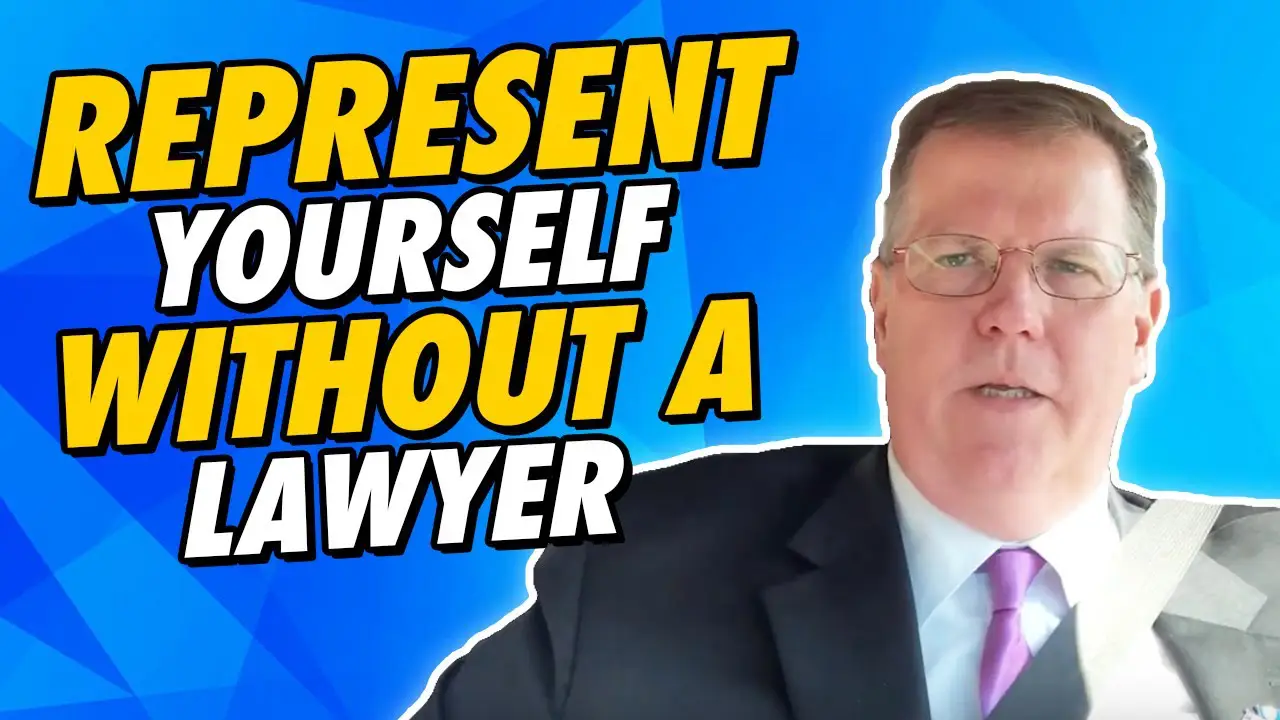
Can you try your case without an attorney and win?
I’m Northern Virginia criminal defense attorney Scott Nolan, and I’m here to help you do just that. One of the most enjoyable times I ever spend in court is when I watch a non-lawyer present an excellent, well-argued, well-reasoned case and win. I want to caution you though that most cases do need an attorney. In most cases, you would be very, very wrong to try and proceed to represent yourself, but not in all cases.
When you need an attorney
If your case might involve jail time, or if your case involves any other serious potential penalty, the loss of your driver’s license, or the loss of a security clearance, you do need an attorney. The same is true if it would have an effect on a custody case that you have coming up.
When you may be able to represent yourself
However, there are a large number of traffic cases and other minor cases where it is okay to represent yourself. When you go to court to represent yourself, the judge may recommend that you step out into the hallway and talk to the Commonwealth’s attorney.
Talking to a prosecutor
In Virginia, we call the prosecutors Commonwealth attorneys. Sometimes, depending on where you are, they might be city attorneys. Generally, talking to them is not a bad idea. You might find that the prosecutor is willing to make a deal with you. But in my experience, talking to the prosecutor does not help if you want to plead not guilty.
Typically, you cannot talk to a prosecutor. In most counties in Northern Virginia, the prosecutors will not talk to you if you’re not represented. And if you are represented they’re going to talk to your lawyer instead. But there are a few counties in Northern Virginia where the prosecutor will step out into the hallway and speak to members of the public. Prince William County is one of these.
In that case, what the prosecutor wants to know is whether or not you have a story that will convince him or her to go easier on you, charge you with something lesser or agree to a lighter sentence. They’re not really interested in talking to you if you intend to plead not guilty. This article is really about people who intend to plead not guilty and try to win their case.
How to approach your case
Step number one is to decide whether this is the sort of case where you need an attorney. Step number two is to consider your argument carefully. It is a mistake to walk into court and then begin to formulate your defense. If you’re going to represent yourself without an attorney, you should proceed like any attorney would.
Understand the law
Step number one is to understand the law. I’ve been a criminal defense attorney for over 20 years, and in every single case, I look up the law. Even if I know it like the back of my hand, the legislature can change the laws, and so I might miss something critical if I don’t look up the law each and every time.
Not only that, but some laws are quite long and perhaps there is a clause hidden in there that might be useful in this case while it wasn’t applicable in my last case. So I read the law every time.
Look up the code number and read the law
The case that you’re charged with will have a code number, a Virginia code number written right on the ticket. Look it up, just google the words Virginia code and then that number. It probably starts with 18.2 but might start with 46.2 or some other number. That will lead you to the actual law. Read the law, it might well be helpful.
Marshall your arguments
Then go ahead and marshall your arguments. What is it that makes you think you’re not guilty? Think about what evidence might be useful to the judge. Are there photographs of the place that would be useful?
Judges are human and they like to look at things just as much as anybody else. If you have something visually interesting, a map, a photograph, or a video, that’s going to go a long way toward helping your case. If you have a witness, that can go a very long way to helping your case as well.
Prepare your argument ahead of time
Get your argument together ahead of time. I suggest writing just a few bullet points on a piece of paper. Don’t write out everything you’re going to say because nobody likes to listen to somebody else read a statement. It’s boring.
You may be thinking, “Well, I’m not a good public speaker. I don’t want to have to talk in court.” Well, then this isn’t for you. Go ahead and hire an attorney. This is really for somebody who’s going to be comfortable speaking in court.
Be sure to look the part
You also need to look the part. You don’t necessarily need to dress like a lawyer, but you do need to dress like you are taking this seriously, and I would recommend that you go dressed as though you’re going to a job interview. I’m the last person on earth to give fashion advice, so just dress as though you’re going to a job interview.
Stay relaxed
Whatever you do, stay relaxed. Probably the key realization that an experienced attorney gets that helps them make the transition from beginner to experienced attorney is to relax in court. When I first walked into a court, I was so tense I could have jumped out of my skin. I kept thinking of all the things I wanted to say, all the things that could go wrong.
Nowadays, I know that all of that is nothing but a distraction. I keep myself nice and calm, I walk in, and I know that the judge is just another man or woman sitting there on a big comfy chair to listen to what I have to say. Just tell the judge the reasons you think you’re not guilty.
Remember, we’ve already agreed that this isn’t the kind of case that’s going to ruin your life if you don’t get it right. So relax. A relaxed person is a much more persuasive person.
How to present evidence
Understand that if you have to put on evidence, that is if you have to ask a witness to speak, you must follow the rules of evidence even though you’re not an attorney. That may sound daunting, but it really isn’t. For the most part, in a case like this, judges are going to give you some leeway. They might even explain that you need to ask things as a question.
Just remember, if you asked a witness to speak for you, you can’t tell them what it is you want them to say. You have to ask questions. Those questions cannot contain the answer. You can’t say, “Hey, you saw me drive under 55 miles an hour, right?”
But you can say, “Thank you for coming, Mr. Jones. You were in the car with me. Isn’t that true?” “Yes.” “Did you see me operating the vehicle?” “Yes, I did.” “Did you observe how fast I was going?” “Yes, I did.” “Can you tell this court how fast I was going?” That’s it. It’s not brain surgery.
Judges like concise arguments. They like demonstrative evidence, that is, something they can look at. Judges like the fact that you care enough about your rights to make an argument. Don’t be afraid to stand up for your rights. Remember that the police officer is not lying. The police officer is mistaken.
How to address the judge
One more thing: no human being should address another human being as Your Honor. It’s an awful idea. We don’t call the president, Your Highness. And you shouldn’t call a judge, Your Honor. We fought a war over 230 years ago to get rid of that nonsense. Please leave it at home. You may refer to the judge very politely as Judge, but for God’s sake, don’t call him Your Honor.
When the judge rules…
Finally, when the judge rules, the case is over. If the judge rules against you, you don’t say, “No, wait, you don’t understand. But, but, but.” Just don’t do it. When the judge tells you, “Thank you very much for that argument, but I do find you guilty,” the only answer to that is, “Thank you for your time, Judge. Where do I go next?” That’s it.
You had your shot. Take your lumps. That’s what we lawyers need to do and that’s what you need to do if you’re going to go into court without one. Win or lose, I want you to pat yourself on the back for trying, for going in, standing up on your own two feet, and making an argument for yourself. It makes me proud to be an American.
If you have any questions about representing yourself in court or any other aspects of the law, feel free to give me a call or contact my office. I’d be happy to talk to you.



